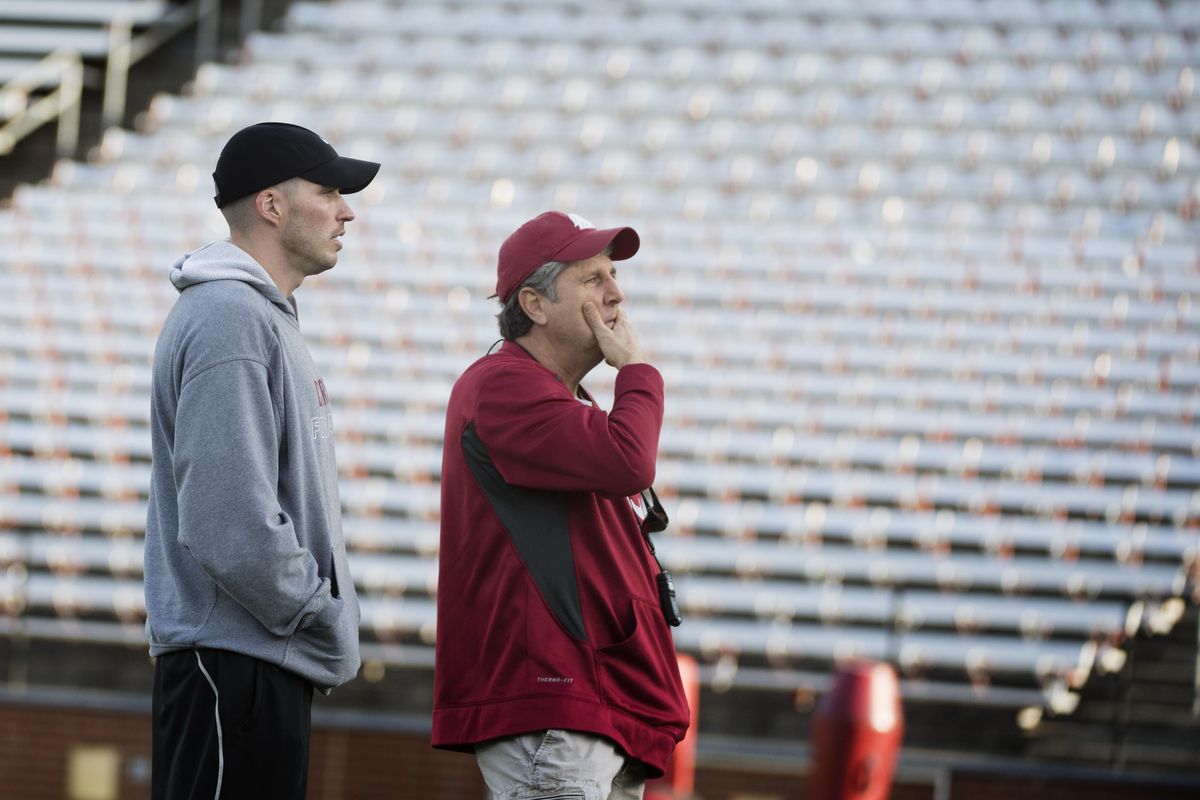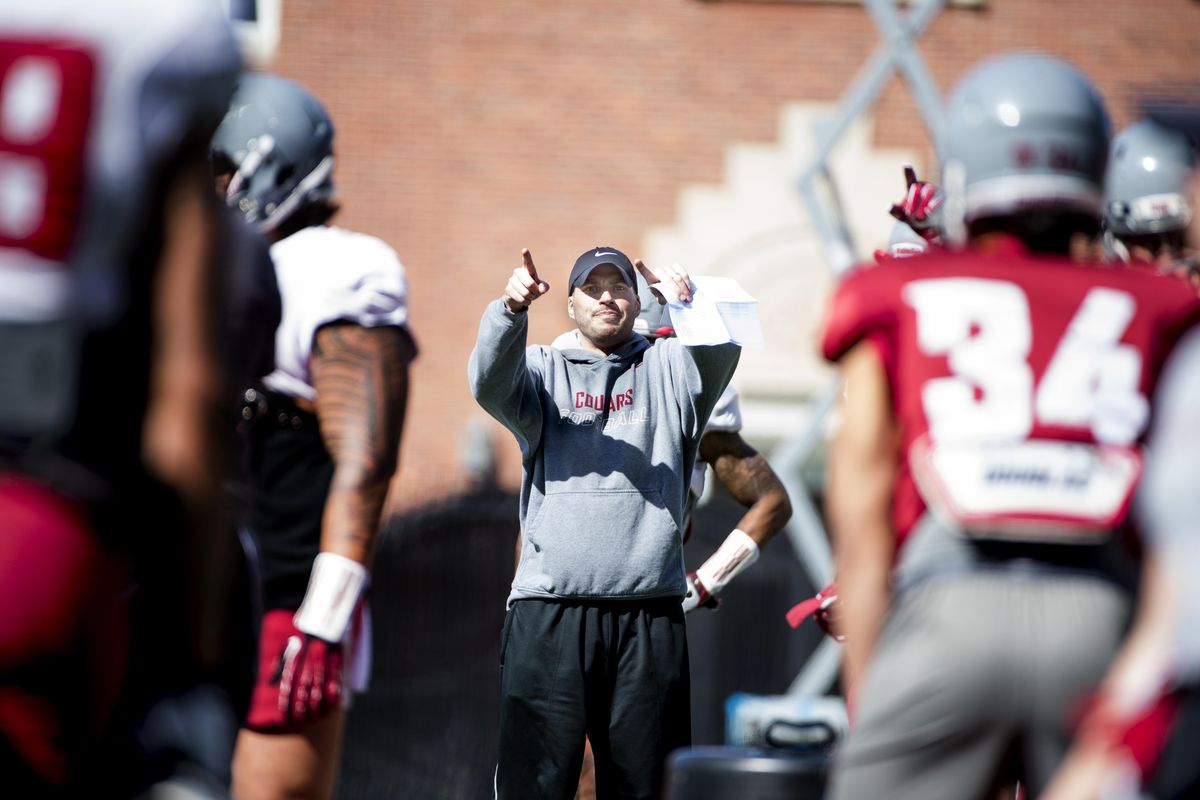Alex Grinch’s unique style of communication wins over Washington State’s defensive players
WSU defensive coordinator Alex Grinch, left, watches players with head coach Mike Leach on March 31 at Martin Stadium. (Tyler Tjomsland / The Spokesman-Review)Buy a print of this photo
PULLMAN – Before the door even closes, Alex Grinch is speaking. Check that, Washington State’s young defensive coordinator is preaching.
His parishioners are 50 or so defensive players and coaches who have filed into the meeting room/lecture hall on the fifth floor of Washington State’s football operations building, most of them coming straight from the adjacent cafeteria that overlooks Martin Stadium’s west end zone.
Head coach Mike Leach, who is busy with the offense, grants the defensive coordinator near-total autonomy. So to the defensive players, Grinch is the head coach.
“Think about the drill that hasn’t been competitive,” Grinch told his players. “It hasn’t happened yet.”
The subject of today’s 17-minute sermon is “Emotional Stability.” There is a striking juxtaposition at work watching Grinch employ the tactics and energy of a Bible Belt pastor while imploring his players to cool their heads, to compete less.
That’s right. Grinch, in his second spring as WSU’s defensive coordinator, is telling his defenders to stop making everything such a competition with WSU’s offense. He’s using everything in his arsenal to get his point across.
The competition is a virtue, no doubt, but Grinch is concerned that the desire to beat their teammates may be trumping the need to put in honest work in every drill, to get better by learning from a mistake at the expense of conceding a play to the offense.
“If we have a great period of 7-on-7, we’re not 1-0. If we have a bad period, we’re not 0-1,” Grinch said later. “If we go out there today and we kick the hell out of the offense, we don’t get a bowl bid. It doesn’t work that way. So what we need to do is make sure we’re focused on getting better at our individual techniques, playing hard.”
Like any good orator, Grinch peppers his lecture with examples, hitting the college basketball championship game, last year’s WSU’s win at Oregon, last year’s WSU win at UCLA, Stephen Curry, the Missouri Tigers and the failure inherent to baseball in rapid succession.
He shows Super Bowl clips. Not highlights, exactly, but examples of the Carolina Panthers’ offense reeling off big plays, only to have Denver’s defense collect itself and limit the damage.
It’s an approach that produces rave reviews. Grinch’s numbers speak for themselves: The Cougars gave up 27.7 points per game in his first year – after giving up 38.6 the year before – and tripled their takeaways from eight turnovers gained to 24.
But the tangibles are byproducts of Grinch’s successful outreach to the players and how they have embraced his fire-and-brimstone-and-poise approach.
“I don’t want to bad-talk our old defensive coordinator, but we knew right away it was an upgrade,” WSU linebacker Peyton Pelluer said. “He’s so hands-on and a lot more personable, in his own way. It makes it easier for us to trust him and understand where he’s coming from. It’s night and day from what we were used to freshman and sophomore year. He’s definitely a sight for sore eyes.”
That approach is the result of decades spent honing a craft that belies Grinch’s recent promotion to coordinator.
A coaching family tree
Before Grinch became a coach, he was a coach critic.
“I remember being in middle school basketball and thinking about how our coach was handling a situation and thinking, ‘I don’t know if I’d handle it that way,’ ” he said.
Grinch had plenty of exposure to different methods. He is the nephew of former Missouri coach Gary Pinkel. Growing up he would hang out with his cousins by watching practices at Washington, where Pinkel was an offensive coordinator under Don James, and then at Toledo, where Pinkel got his first head coaching job.
“(The cousins) were competitive all the time,” Pinkel said. “Competitiveness, you can get guys to compete a little bit harder, but I think the mindset of being competitive is something you’re born with. Like me, I’m competitive trying to beat a traffic light that I’ve got to go through. It’s ridiculous. That’s overboard, but it’s probably been good for me. I think that’s the way Alex is, too.”
Grinch knew success at every level of football as he came up. He played at Division III Mount Union College, where his team lost one game in 55 chances. Years at New Hampshire, Wyoming and Missouri were culminated in FCS quarterfinals appearances, bowl games and SEC East championships.
During those years Grinch developed an approach to coaching in which he tries to motivate his players not on the Saturday morning before kickoff, but on the rainy Tuesdays before practice. He knows that his players cannot turn on excellence like a switch but must foster it during the week, and that consistent action matters more than daily victories over teammates.
“There are instances on film where we’re in a 1-on-1 battle, and we’re not playing our defense,” Grinch said. “We just want to win that rep, somehow, some way. If we do, we’re going to be excited by it. In the end, we waste that rep, because we’re not working on our fundamentals and our technique. “
Another example: Of the six offensive formations WSU faced most often last year, they will not see four of them until the start of next season. Yet Grinch frequently makes calls in practice that he knows are a bad fit for what the offense is about to throw at his defense, knowing his players must prepare for a lot more than just the Air Raid.
With a honed strategy and a well of experience from which to draw, Grinch, 35 years old, believed himself ready to oversee his own defense. He just needed someone to give him one.
Finally, an opportunity
Did Grinch seem nervous at all during his interview with Leach?
“Not very!” Leach laughs. “It was more like, ‘I know what I’m doing and somebody’s going to hire me and I hope it’s you.’ ”
Leach fired defensive coordinator Mike Breske after the Cougars went 3-9 in 2014. The position was widely believed to be a daunting one, given the youth and apparent talent on WSU’s defense.
Leach reportedly met with then-Texas defensive coordinator Manny Diaz, who now holds the same position at Miami. The search took longer than expected, but there was a coach at Missouri who came highly recommended.
“I knew Mike was going to highly consider him, once he interviewed him,” Pinkel said. “I told Mike this: ‘Once you interview him, you might not hire him. But he’s going to be No. 1 or No. 2.’ ”
Leach brought Grinch in for an interview. The two watched film, with Leach throwing scenarios at Grinch and seeing how he would adjust. Leach liked how the secondary coach had been involved with multiple positions, how he knew about the defensive line and it’s relationship to blitzes.
He liked that Grinch was a clear communicator, and that he had an enthusiasm that seemed fairly infectious. Mostly, he liked how much Grinch wanted the job.
“I remember when I was in that position,” Leach said. “And a guy who is ready for it, and really wants and meets that opportunity, that’s the guy you want. There’s nothing that replaces motivation.”
Grinch won over the head coach, and shortly after, the locker room. After a clearly successful first season, when he talks, everybody in the room is listening.

